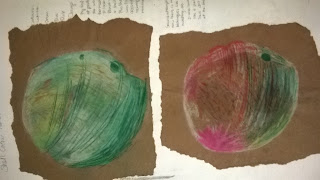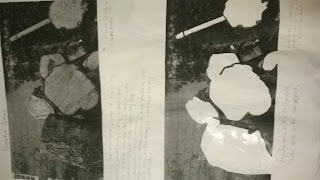I used the emulsion and newspaper collage for the art board's background. This board will be for Nel Ten Wolde. The artist uses mixed media and lots of collage in their work therefore I thought using a collage as the background would reflect their art style. The emulsion also covers the newspaper text so my sentences can be visible on the board.
Showing posts with label Collage. Show all posts
Showing posts with label Collage. Show all posts
Friday, 13 May 2016
Sunday, 20 March 2016
Woven word with photo
 After receiving feedbacks on my sketchbook, one of the comments that got my interest was the woven word technique. They believe the technique was nicely done and should be used in my work to extend the variety of skills I have used for my works. So I thought that should use the technique for Minjae Lee inspired works. His works are notable for the small yet vivid patterns that marks the faces of his portraits.
After receiving feedbacks on my sketchbook, one of the comments that got my interest was the woven word technique. They believe the technique was nicely done and should be used in my work to extend the variety of skills I have used for my works. So I thought that should use the technique for Minjae Lee inspired works. His works are notable for the small yet vivid patterns that marks the faces of his portraits.I like how it still retains the shape, the face is still visible in the weave.
Tuesday, 15 March 2016
Thursday, 26 November 2015
Gonkar Gyatso
 Gonkar Gyatso is a Tibetan-British artist who was born in 1961 in Lhasa, Tibet. Gyatso attained a B.F.A in Chinese Brush Painting at the Minzu University of China in Beijing. He also studied Thangka, which is traditional Tibetan scroll painting in Dharamsla. Gyatso moved to London during the 90’s with a scholarship to the Central St. Martins College in London. He attained his MA in Fine Art. [2] [3]
Gonkar Gyatso is a Tibetan-British artist who was born in 1961 in Lhasa, Tibet. Gyatso attained a B.F.A in Chinese Brush Painting at the Minzu University of China in Beijing. He also studied Thangka, which is traditional Tibetan scroll painting in Dharamsla. Gyatso moved to London during the 90’s with a scholarship to the Central St. Martins College in London. He attained his MA in Fine Art. [2] [3][1]
Interview with Gonkar Gyatso, January 23rd 2014 [4]
HK: What led you to work with imagery of Buddha?
GG: The shape is how I deliver my own vision of the harmonious coexistence of a lot of different things. For instance, when you look at the outline of one work it is [the form of] a reclining Buddha, but when you look inside there are 10 or 20,000 stickers in one piece. And these stickers come from different places, represent different meanings, and I try to put them all together—it’s kind of like Hong Kong, really. But they’re all living quite happily together, very harmoniously. It’s also related to the Buddhist idea of tolerance—you have to be open, you have to be kind, and tolerant of anything.
“With a long interest in material and pop culture, Gyatso often combines references to traditional Tibetan life with references to the global mass-media culture that is constantly interacting with, and shaping, our current perspectives of cultural identity. By confronting the undeniable bond between his homeland’s religion and politics Gyatso throws into question what is considered traditional, whilst addressing the many new cultural hybrid identities to which globalisation has given rise.” [5]
A lot of Gonkar Gyatso's works feature Buddha since Buddhism is very influential in traditional Tibetan lifestyle and right now, my main focus of culture is on my miniature Buddha statue. So I think this artist will be a good source for ideas and techniques. I admire the way he is able to blend two contrasting ideas into one harmonious piece with subtle or vivid references to religion, politics and pop-culture. His interest in the fusion of tradition and modernisation is often depicted in his work and also in how his work is presented. He uses mixed media collage frequently to represent his idea on the concept of pop-culture seeping into the traditional Tibetan life. His work can also represent the decay of traditional values as the influence of modern ideology increases and how tradition will soon be nothing more than f a d e d m e m o r i e s . . .
Shangri La, 2014
Mixed media collage on Aluminum backed honeycomb panel
76 x 76 cm (29 9/10 x 29 9/10 in.)
In this piece, the Tibetan mandala has been consumed by a flame with a group of people surrounding it with cameras and many other mobile technologies (planes, jets, helicopters, etc)This represents the religion been used as a commercial subject, the camera at the top right corner shows that the whole culture is been recorded for the purpose of educational entertainment/ documentary on religion.
Or this artwork could represent the Cultural Revolution when China tried to oppress the Buddhism influence. The black drawing like the helicopters and jets represent China trying to oppress the Buddhism, which is represented by the mandala. The flame could represent either the fall of Buddhism or the everlasting passion of the Buddhism which the oppressors could not put out.
Gonkar Gyatso, Untitled (silver base), 2012, mixed media collage, and pencil on resin sculpture,
(16 x 18 x 12in)
Image courtesy the artist and Pearl Lam Galleries.
Gyatso used one of Buddha’s famous pose, removed their head and applied logos and stickers on to the body. This could represent how the teachings or the identity of Buddhism is slowly lost in the modern world and especially with the new-born generations. The collage itself was not named to further hint the loss of culture in the artist’s perception.
Bibliography:
[1] Photo of Gonkar Gyatso - http://www.nytimes.com/2014/10/09/arts/international/tibetan-artists-like-gonkar-gyatso-are-rising-to-the-fore-in-contemporary-art.html?_r=0
[2] Biography - http://www.gonkargyatso.co.uk/about-the-artist/artist's-bio
[3] Biography - http://hk-magazine.com/city-living/article/gonkar-gyatso
[4] Interview - http://hk-magazine.com/city-living/article/gonkar-gyatso
[5] Press Release - http://artradarjournal.com/2014/09/26/pop-phraseology-in-hong-kong-tibetan-artist-gonkar-gyatso-interview/
[6] Shangri La - http://www.pearllam.com/artist/gonkar-gyatso/
[7] Untitled work - http://artradarjournal.com/2014/09/26/pop-phraseology-in-hong-kong-tibetan-artist-gonkar-gyatso-interview/
Sunday, 1 November 2015
Sketchbook Refinement
 I moved all the lock drawings from two pages into just one page. This one page now looks more detailed and there isn't any big gaps left out.
I moved all the lock drawings from two pages into just one page. This one page now looks more detailed and there isn't any big gaps left out.
I had another Buddha collage below the collage work I had done in class to fill up the big empty space there. I used peach coloured paper and black Biro pen to draw the statue, since black will stand out more with a peach background.
I changed the place of the colour pastel shells so it appears before the still life object drawings rather than in the middle of the still life works.
I took the negative space work out of the A4 paper I was using as a replacement for my sketchbook which I didn't have at the time I practiced this technique in class.
I also placed the fragmentation work on the page of my sketchbook instead of the A4 paper I used as replacement for the sketchbook. The replacement paper was stiff and would often peel off the sketchbook, making my sketchbook look very unprofessional and unappealing.
Friday, 30 October 2015
More Buddha Statue Collage
I created another collage of the Buddha statue since there was a big gap in my sketchbook that needed to be filled in. I used the same method as I used for the newspaper collage.

I chose charcoal, it was easier to draw because the surface was quite flat allowing me be more accurate with the statue's physique.
Three Collage Buddhas
Reusing the same steps I had used for the newspaper collage, I was able to make three more collages using coloured crepe paper collage.
Ripping up the crepe paper and using PVA glue to stick it to the sketchbook.
Applying the emulsion and then peeling the paper off.
Using more emulsion on the peeled work.
Drawing the Buddha statue using charcoal before finishing with a hair spray covering.
Second collage; using the same steps here as well.
Ripped green crepe paper.
Emulsion applied.
Peel off the paper and apply another layer of emulsion.
I drew the Buddha statue with a red Biro pen because in the colour theory, red is the opposite of green and this strong contrast should make the statue drawing stand out.
Collage with still life object
I ripped up newspaper to lay it down as the background for my collage piece.
Then I applied emulsion.
I peeled off some newspapers.
I drew my Buddha statue on to the collage using charcoal. Later on I had to use hair spray so the charcoal does not rub off.
With the peeled newspapers, I used them to create another collage;
I placed together all the peeled newspaper into another paper.
I applied another layer of emulsion.
I tried to draw the Buddha statue on the newspaper but since there are a lot of bumps, it was more difficult to draw the statue in an uneven surface. So, the charcoal drawing isn't very visible or accurate on this collage.
Subscribe to:
Posts (Atom)













































